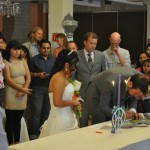With over 40% of marriages in America being between individuals of different faiths, the idea of interfaith marriages should be easy to absorb. Yet couples struggle with resistance from their families who do not accept their union. To help interfaith couples deal with the negativity around them, several support groups have come forward.
The best way to come to terms with your problems and solve them is by discussing it with others who have been or are going through it. Interfaith Community aims to bring couples from different religious backgrounds together and help them beat the negativity surrounding them.
The group based in New York holds couples workshops, private counseling sessions and has an elementary school curriculum designed to teach the fundamentals of Judaism and Christianity for interfaith families.
Sheila Gordon, the group’s president, told the NY Times: “In this multicultural, global, diverse world, where people are bringing many differences into a family, the old post-World War II paradigm, where you married the boy next door and everyone went to the same church, has completely changed.”
According to Dr. Gordon, as much as 100 children are enrolled in the educational programs geared towards bridging an understanding between both religions. But the number of pre-marital couples attending workshops has gone down, despite the number of interfaith marriages going up.
Interfaith Community’s president believes its because of the change in mindset of millennials. “The millennial ethos of fairness and respect means [millennials] don’t feel threatened by entering into this kind of partnership,” she said.
Although some couples may not deem them necessary, others have found such programs life-changing. Especially for those with families. The adult programs by the group stress that adults in interfaith relationships be knowledgeable and appreciative of their own and their partner’s religion. It not only elongates an interfaith relationship, but is “critical to effective, respectful parenting around religion.”


